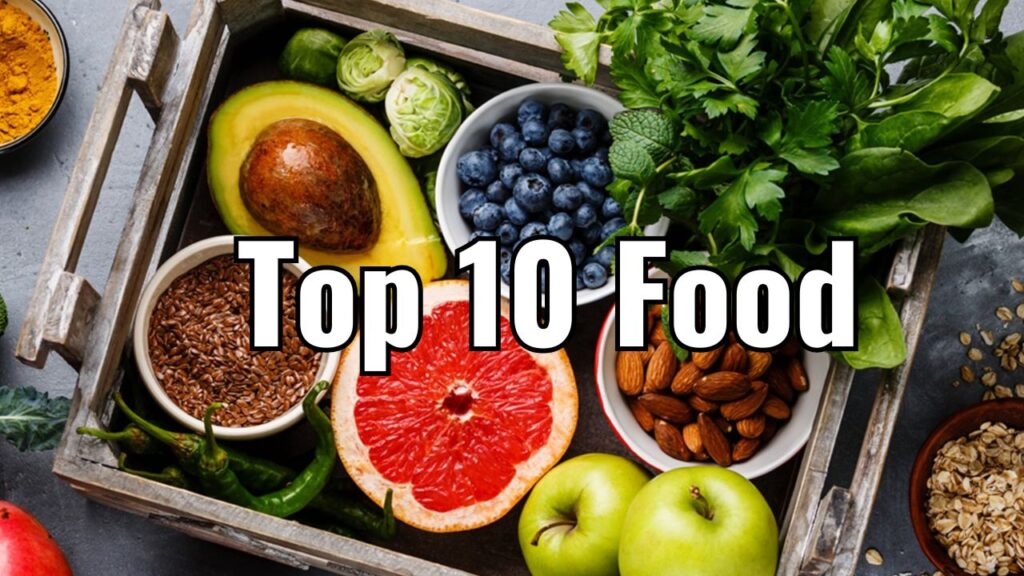Maintaining a healthy diet is crucial for overall well-being. The foods we consume play a significant role in providing essential nutrients, promoting good health, and preventing various diseases. In this comprehensive guide, we will explore the top 10 foods that are not only delicious but also packed with health benefits. From hydration to heart health, these foods cover a wide range of nutritional needs. So, let’s dive in and discover the power of these amazing foods!
1. Water: The Foundation of Health
Water is the foundation of life and the most vital nutrient our body needs. Staying hydrated is essential for maintaining bodily functions, regulating body temperature, and promoting overall health. It is recommended to drink 8 to 12 cups of water daily to ensure optimal hydration. By drinking an adequate amount of water, you can support digestion, improve nutrient absorption, and flush out toxins from your body.
Advertisement
2. Dark Green Vegetables: Nutrient Powerhouses
Dark green vegetables are nutritional powerhouses packed with vitamins, minerals, and antioxidants. These vegetables, such as broccoli, peppers, brussel sprouts, kale, and spinach, offer a wide array of health benefits. Including dark green vegetables in your diet at least three to four times a week can boost your immune system, improve digestion, and support heart health.
Advertisement
3. Whole Grains: A Wholesome Choice
Choosing whole grains over refined grains is a wise decision for your health. Whole grains like whole wheat flour, rye, oatmeal, barley, amaranth, and quinoa are rich in fiber, vitamins, and minerals. Incorporating whole grains into your diet two to three times daily can help maintain a healthy weight, regulate blood sugar levels, and reduce the risk of heart disease.
4. Beans and Lentils: A Plant-Based Protein Source
Beans and lentils are excellent sources of plant-based protein and are also rich in fiber, vitamins, and minerals. Including a bean-based meal in your diet at least once a week can provide numerous health benefits. Add legumes like beans and lentils to soups, stews, casseroles, salads, or enjoy them plain. They can help improve digestion, lower cholesterol levels, and support weight management.
Advertisement
5. Fish: Omega-3 Fatty Acids for Heart Health
Fish, such as salmon, trout, herring, bluefish, sardines, and tuna, are rich in omega-3 fatty acids, which are essential for heart health. Consuming two to three servings of fish per week, with each serving consisting of 3 to 4 ounces of cooked fish, can help reduce the risk of cardiovascular diseases, support brain health, and promote healthy skin.
6. Berries: Antioxidant-Rich Superstars
Including two to four servings of fruits in your daily diet is essential, and berries should be at the top of your fruit list. Berries like raspberries, blueberries, blackberries, and strawberries are packed with antioxidants that help fight inflammation and protect against chronic diseases. They are also a great source of vitamins, minerals, and fiber, making them an excellent choice for overall health.
7. Winter Squash: Colorful and Nutrient-Dense
Winter squash, including butternut and acorn squash, are not only delicious but also richly pigmented with dark orange and green colors. These vibrant vegetables, along with sweet potatoes, cantaloupes, and mangoes, are packed with essential vitamins, minerals, and antioxidants. Adding these colorful vegetables to your diet can support eye health, boost immunity, and provide anti-inflammatory benefits.
8. Soy: Plant-Based Protein and Cholesterol Management
Soy products like tofu, soy milk, edamame soybeans, tempeh, and texturized vegetable protein (TVP) are excellent sources of plant-based protein. Consuming 25 grams of soy protein daily as part of a low-fat diet can help lower cholesterol levels and reduce the risk of heart disease. Incorporate soy into your diet to enjoy the benefits of this versatile and nutritious plant-based protein.
9. Flaxseed, Nuts, and Seeds: Healthy Fats and Essential Nutrients
Flaxseed, nuts, and seeds are packed with healthy fats, essential nutrients, and fiber. Adding 1 to 2 tablespoons of ground flaxseed or other seeds to your meals each day or including a moderate amount of nuts (1/4 cup) in your daily diet can offer numerous health benefits. These foods can improve heart health, support brain function, and provide a feeling of satiety.
10. Organic Yogurt: Calcium for Strong Bones
Calcium is essential for maintaining strong bones and teeth. Men and women between 19 and 50 years of age need 1000 milligrams of calcium daily, while those over 50 need 1200 milligrams. Including nonfat or low-fat organic dairy products, like yogurt, in your diet three to four times a day can help meet your calcium requirements. Organic choices are recommended to avoid exposure to unnecessary hormones and antibiotics.
Conclusion
Incorporating the top 10 foods for health into your daily diet can have a significant impact on your overall well-being. From the hydration benefits of water to the heart-healthy omega-3 fatty acids in fish, each food offers unique advantages. Remember to maintain a balanced diet and consult with a healthcare professional or nutritionist to personalize your dietary needs. Embrace the power of these nutritious foods and enjoy a healthier lifestyle!
Additional Information:
- It is important to note that individual dietary needs may vary, and it is always advisable to consult with a healthcare professional or nutritionist for personalized guidance.
- The recommended serving sizes and frequency of consumption mentioned in this guide are generalized and can be adjusted based on individual preferences and requirements.
Primary Keyword: Foods for Health Secondary Keywords: hydration, dark green vegetables, whole grains, beans and lentils, fish, berries, winter squash, soy, flaxseed, nuts and seeds, organic yogurt

